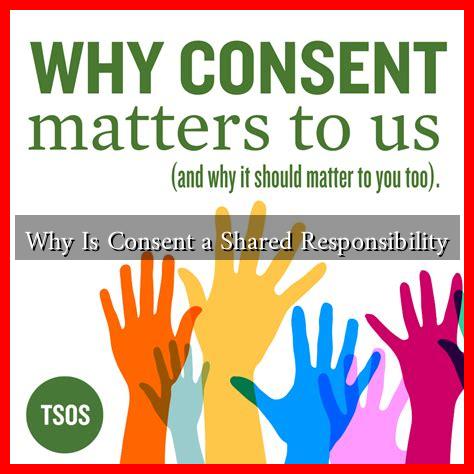-
Table of Contents
Why Is Consent a Shared Responsibility?
Consent is a fundamental aspect of human interactions, particularly in intimate relationships. It is often perceived as a straightforward agreement between two parties; however, the reality is much more complex. Understanding consent as a shared responsibility is crucial for fostering healthy relationships and preventing violations. This article explores the multifaceted nature of consent, its implications, and why both parties must actively engage in the process.
The Definition of Consent
Consent is defined as an agreement between participants to engage in a specific activity. In the context of sexual relationships, it means that all parties involved have given clear, informed, and voluntary permission to proceed. However, consent is not a one-time event; it is an ongoing process that can be revoked at any time.
The Importance of Clear Communication
Effective communication is the cornerstone of consent. Both parties must feel comfortable expressing their desires, boundaries, and concerns. Here are some key points to consider:
- Open Dialogue: Engaging in honest conversations about preferences and limits can help establish a mutual understanding.
- Active Listening: Listening to your partner’s feelings and concerns is essential for ensuring that both parties feel respected and valued.
- Non-Verbal Cues: Body language and other non-verbal signals can also indicate comfort or discomfort, making it vital to pay attention to these cues.
Shared Responsibility in Consent
Consent is not solely the responsibility of one party; it requires active participation from everyone involved. Here are some reasons why consent is a shared responsibility:
- Power Dynamics: In many relationships, power imbalances can affect the ability to give or withdraw consent. Both parties must be aware of these dynamics and work to create an equitable environment.
- Education and Awareness: Understanding what constitutes consent is essential for everyone. Educational programs can help individuals recognize their responsibilities in the consent process.
- Accountability: When both parties take responsibility for consent, it fosters a culture of accountability. This can lead to healthier relationships and a reduction in instances of sexual violence.
Case Studies and Statistics
Research shows that misunderstandings about consent are prevalent. According to a study published in the Journal of Interpersonal Violence, nearly 70% of college students reported experiencing situations where they were unsure if they had received consent. This highlights the need for clearer communication and shared responsibility.
Furthermore, the Rape, Abuse & Incest National Network (RAINN) reports that 1 in 6 women and 1 in 33 men have experienced an attempted or completed rape in their lifetime. These statistics underscore the importance of understanding consent as a shared responsibility to prevent such violations.
Examples of Shared Responsibility in Action
To illustrate the concept of shared responsibility in consent, consider the following scenarios:
- Scenario 1: A couple discusses their boundaries before becoming intimate. They agree to check in with each other throughout the experience, ensuring that both feel comfortable and respected.
- Scenario 2: A group of friends attends a party where they discuss the importance of consent openly. They create a safe space for individuals to express their feelings and concerns, promoting a culture of respect.
Conclusion
Understanding consent as a shared responsibility is vital for fostering healthy relationships and preventing sexual violence. Clear communication, awareness of power dynamics, and accountability are essential components of this process. By recognizing that both parties play a crucial role in obtaining and respecting consent, we can create a culture that values mutual respect and understanding.
As we move forward, it is essential to continue educating ourselves and others about the importance of consent. For more information on consent and healthy relationships, consider visiting resources like RAINN or Love Is Respect.

